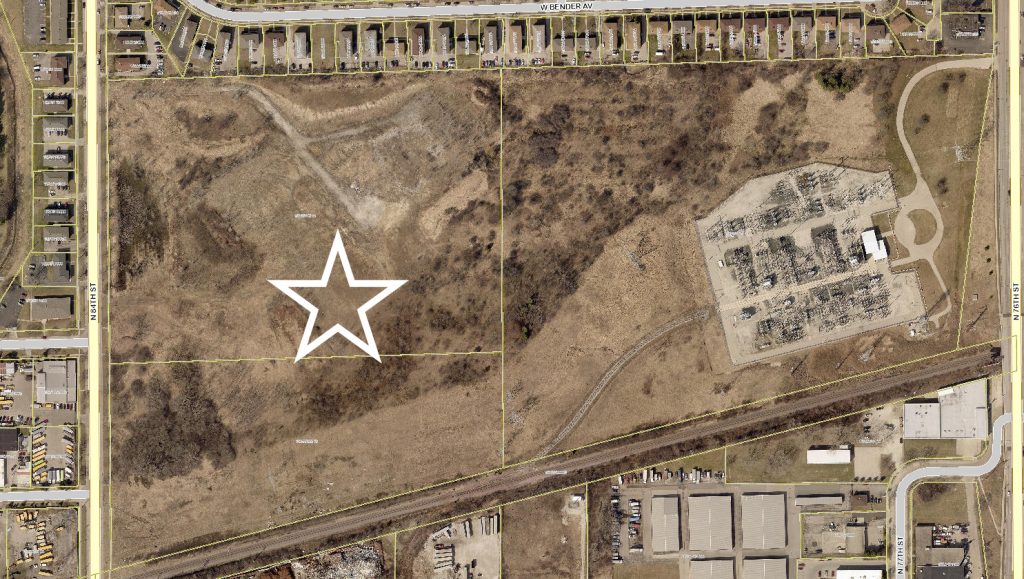State’s Biggest Battery Energy Storage System Planned
$450 million northwest side facility part of shift to renewable energy.

American Pharaoh Battery Energy Storage System site on N. 84th St. Image from City of Milwaukee Land Management System.
An unusual energy facility is proposed for an undeveloped site near N. 84th Street and W. Mill Road.
Black Mountain Energy Storage intends to build a $450 million battery energy storage system to draw energy from the electrical grid and release it back into the grid during supply shortages or peak demand periods.
It would be Wisconsin’s biggest battery energy storage system (BESS). The systems are designed to enable a bigger shift to renewable energy sources, for which power generation can be variable, by providing an alternative energy source that can smooth out supply-and-demand mismatches. BESS facilities are also intended to improve the electrical grid’s reliability and resolve transmission bottlenecks.
“We didn’t pick this site just because we happened to like it. We need to be in proximity to a substation,” said Brian Randall, an attorney with Amundsen Davis, to the City Plan Commission on Sept. 25.
The battery storage property, 6100 N. 84th St., is bordered to the east by We Energies‘ Granville Substation. A high-voltage transmission line runs along the southern portion of the site, paralleling a rail line.
“From the substation, we would draw the electricity, store it on the batteries, hold it until a future use when it’s most needed,” said Black Mountain development manager Jackson Hughes. The system refers to the facility as American Pharaoh BESS in its planning documents.
Enclosed racks of lithium-ion batteries would have a combined 1,200-megawatt hour storage capacity. The system is described as being capable of providing 300 megawatts of energy for four hours. Based on descriptions of other BESS facilities, American Pharaoh would have the capacity to power 90,000 homes for four hours.
Black Mountain would develop approximately 10 acres of the 32-acre property. There would be a 200-foot buffer to the north and a 271-foot buffer from N. 84th Street to the west.
“We will have 112 battery enclosures on site, but those battery enclosures won’t exceed 40 feet in length or eight feet in height,” said Randall. The enclosures would sit on concrete pads.
A sound study was completed as part of the planning process and Randall said a sound barrier wall would likely be required before the final plan is made. “We will have an appropriate barrier,” he said.
The project has the support of area alderman Mark Chambers, Jr. “They went through a tough conversation with me,” said Chambers. “They went above and beyond.” He said he was partly supporting the project because of his role as a co-sponsor of the city’s Climate and Equity Plan.
The plan commission unanimously endorsed the proposal on the conditions that the sound study is completed when a final technology is selected and a final landscaping plan is created.
The energy could be sold to customers throughout the 15-state Midcontinent Independent System Operator (MISO) power grid. MISO also needs to approve the facility, as does the State of Wisconsin‘s Public Service Commission.
In the past two years, Austin-based Black Mountain has sold several BESS facilities under development in Texas to institutional investors. The company was founded in 2021 by Houston-based Black Mountain, which has substantial oil and gas operations. It reports more than 30 projects under development, totaling six gigawatts, and 15 sold, totaling two gigawatts.
But it hasn’t completed one yet. “We don’t have any operational facilities ourselves. This is also a very new technology, so there are only so many in the nation, but there are certainly battery storage facilities located within residential areas,” said Hughes.
No employees would actively work at the facility once it is operational. Construction is expected to take 12 to 14 months.
The current zoning designation was established in 1998 as part of Balm In Gilead For All People church’s plans to develop a massive church facility. A portion of the property is also protected by a wetland zoning overlay.
The church sold the property, technically two parcels, to Christian Faith Fellowship Church for $350,000 in 2007. Black Mountain would purchase the property from Christian Faith.
Westwood Professional Services is providing civil engineering support for the facility’s development. Evergreen Design Group is leading the landscape design and Wisconsin Lighting Lab is leading the lighting component.
Legislation Link - Urban Milwaukee members see direct links to legislation mentioned in this article. Join today
If you think stories like this are important, become a member of Urban Milwaukee and help support real, independent journalism. Plus you get some cool added benefits.
Related Legislation: File 230708
Eyes on Milwaukee
-
Church, Cupid Partner On Affordable Housing
 Dec 4th, 2023 by Jeramey Jannene
Dec 4th, 2023 by Jeramey Jannene
-
Downtown Building Sells For Nearly Twice Its Assessed Value
 Nov 12th, 2023 by Jeramey Jannene
Nov 12th, 2023 by Jeramey Jannene
-
Immigration Office Moving To 310W Building
 Oct 25th, 2023 by Jeramey Jannene
Oct 25th, 2023 by Jeramey Jannene




















